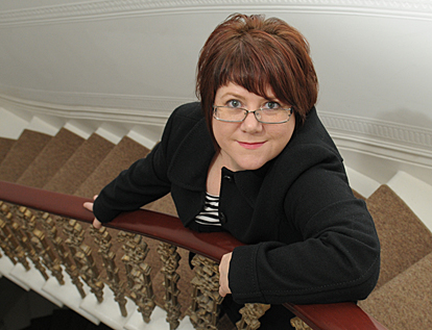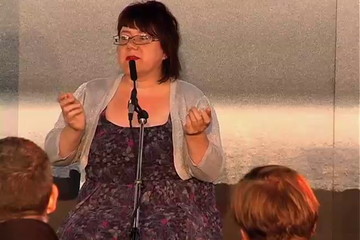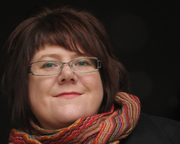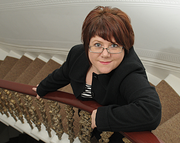Vanishing Point
By Louise Welsh
We have commissioned a new piece of writing from fifty leading authors on the theme of 'Elsewhere' - read on for Louise Welsh's new story...
From this position I can see the slow progress of late afternoon shadow across the wall at the end of my bed. When the shade creeps beyond the top corner, turning it from stark white to a pale shade of blue-grey, someone will come and turn me. Then I’ll see the bottom of the door, the scuffed legs of the visitor’s chair, the grey vinyl floor occasionally enlivened by a tuft of stoor. I prefer the top corner, the unstoppable march of shadow played out each day across the intersection of edge and wall, my vanishing point.
In the morning when my mother visits, neon tubes turn the room a startling sugar-cube bright. I’m clean and freshly wiped. Mother kisses my cheek, strokes the hair back from my face, and tells me about her world. A scream used to form in my head as her voice trembled through news of names I hardly knew, but the wall has taught me patience. The tides of words lose themselves of meaning, reduced to a rhythm that sings of my childhood.
I stare at the corner. It’s clean and neatly defined. A meeting of boundaries composed of three lines. Both walls and ceiling end in right angles, but their union bestows a triangular aspect, like the crease of leg and lap that meet at the top of a woman’s thighs.
Once she’s brought me up to date my mother opens her bag and takes out a book. Apart from the moment when I’m rolled from the view of floor and stoor to the crispness of angles, this is the highlight of my day.
When I was first locked in Mother used to follow news of her world with news of the world beyond. The newspaper would be unfurled and I’d hear the pages rustle as she scanned them for stories fit to repeat. The sessions grew so short she was compelled to read the sports reports.
Then one day a book appeared. She held it in front of my face, blocking my view of the corner, so I could inspect its cover. A vapid blue sky turned to star spattered black as a spaceship hurtled upwards. I wondered if the strain of being boxed in with me each day had turned Mother’s mind. But she explained she’d found three boxes of paperbacks abandoned on the pavement outside her building and had paid the grandson of her downstairs neighbour a pound and a volume of his choosing to carry them up to her flat.
The paperbacks’ broken spines and well-thumbed pages made it clear they’d been read more than once. Mother had never been attracted to sci-fi before, but she reckoned that books so thoroughly studied must be worth taking a chance on. I don’t know if their origins intrigued her from the first, but pretty soon the books became more than their contents to her.
As she reads she explores the pages for clues of where PB Bridgestock (the name is scrawled on the inside cover of each volume) read them before us.
‘Look,’ she’ll say, ‘he either dropped this in the bath or sat with it in the steam room for too long. See how the pages are warped? Paper can’t take moisture, especially cheap paper like this.’ She delights in PB Bridgestock’s travels as if they’re her own. ‘He read this on a beach somewhere. I thought that stain might be hamburger grease, but see, some sand’s got into the spine. The mark must be suntan lotion.’ And she pauses for a moment as if remembering a world where there are beaches and a sun people oil up for. The books kept PB Bridgestock company at mealtimes (he was a fan of English mustard), on buses and trains, even once or twice on an aeroplane (PB was inclined to use tickets and boarding passes as bookmarks). They had accompanied their original owner on idle afternoons lazing outdoors where tiny insects were inadvertently trapped, then mummified between the pages.
The clues to PB Bridgestock’s reading habits that thrill my mother exasperate me. I love the books for their power to lift me up, beyond even the corner. Mother’s voice recedes. My crew and I are floating through the universe, on a spacecraft that has lost its bearings in time, certain that somewhere on the ship lies a hostile force. Mother reads on, speeding me through starry galaxies where survival is uncertain and adventures guaranteed.
When it’s time for her to leave, I look into Mother’s eyes and tell her,
9 12 15 22 5 25 15 21
I L O V E Y O U
Sometimes I say,
19 15 18 18 25
S O R R Y
No one else ever visits, and for that I’m grateful, though sometimes I hear old voices, faint, like whispers in a stairwell, no change, poor soul.
The doctors do their rounds every afternoon, a recurring drill of charts and low exchanges with the duty nurse. They generally leave without acknowledging me. But occasionally one or other of them will take the time to sit by my bed and ask how I am. I say,
16 12 5 1 19 5 11 9 12 12
P L E A S E K I L L
13 5
M E
The doctors know how much the please cost me, fifty-eight flickers of my eyes.
Late afternoon drifts into dusk as my mother switches from one bus to another and then another. One of PB Bridgestock’s books is tucked safe in her bag and she stares out of the window at drivers stalled in the tailbacks that line her route. Some sing or smoke or talk lawlessly on mobiles, but mostly they sit alone, their faces unreadable.
Sometimes a stranger sits next to her and begins a conversation. She rouses herself knowing, that at her age, politeness depends on cheer.
‘I was just in town picking up a bit of shopping,’ she usually says, though sometimes her inventions surprise herself; grandchildren who grow out of their shoes as if there’s no tomorrow, a husband who demands his steak comes from a far-flung butcher, a meeting of some vague committee she takes the minutes for. From time to time she’ll say, ‘I was up at the hospital, visiting my daughter’.
My mother unlocks the door to her apartment. She sets her bags in the kitchen, slips off her shoes and then walks barefoot through to the bedroom where she changes into her house clothes. The neat-made bed tempts her, but sleep is an enemy and a nap now will almost certainly mean a wakeful night. She pulls on her slippers and returns to the kitchen where she unpacks her messages before sitting at the kitchen table and lighting up a cigarette. Mother sits smoking by the open window, feeling the night air on her skin, looking out at the apartment blocks beyond, each one a perfect mirror of the block that contains her.
I look at the sure stillness of the corner and imagine myself made small, sitting in the cockpit of a rocket, speeding towards it. The corner spins open, a portal admitting me to its whiteness. I pull down on the joystick and zoom on, into the blackness beyond. The hospital buildings shine palely below, tiny in the dark, the H of the helipad smaller than the nail on my pinky. The rocket zooms on, along the route it took my mother hours to travel and within seconds I’m hovering bright and silent outside her kitchen. She gets to her feet stubbing out the cigarette, opening the window wide. The rocket sweeps into the brightness of the room, and I see the same table, the same lino, the same wallpaper I knew as a child. The past is real and everything beyond it a dream.
I lower the door of the rocket and mother climbs its ramp. She smiles as she buckles in, our eyes meet and all of a sudden we’re laughing. I fire up the engines and we speed out through the window, vanishing into the beyond, bound for elsewhere.





 Major new partnership with Celtic Connections
Major new partnership with Celtic Connections 

